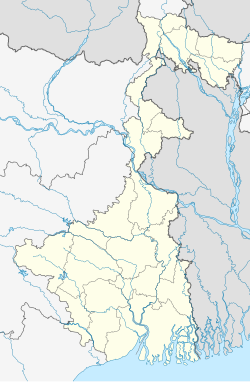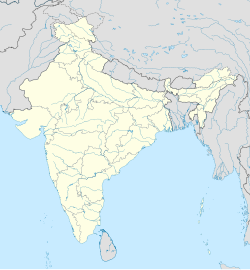Mangarjung Tea Garden (Nagri) is a census town in the Jorebunglow Sukhiapokhri CD block in the Darjeeling Sadar subdivision of the Darjeeling district in the state of West Bengal, India.
Mangarjung Tea Garden (Nagri) | |
|---|---|
Census Town | |
| Coordinates: 26°55′29″N 88°11′22″E / 26.9248°N 88.1895°E | |
| Country | |
| State | West Bengal |
| District | Darjeeling |
| Area | |
• Total | 5.524 km2 (2.133 sq mi) |
| Population (2011) | |
• Total | 5,644 |
| • Density | 1,000/km2 (2,600/sq mi) |
| Time zone | UTC+5:30 (IST) |
| PIN | 734215 |
| Telephone/STD code | 0354 |
| Lok Sabha constituency | Darjeeling |
| Vidhan Sabha constituency | Kurseong |
| Website | darjeeling |
Geography
edit5miles
CT: census town, R: rural/ urban centre, NP: national park/ wildlife sanctuary, TE: tea estate
Abbreviations used in names – TG for Tea Garden (town/village), TE for Tea Estate
Owing to space constraints in the small map, the actual locations in a larger map may vary slightly
Location
editMangarjung Tea Garden (Nagri) is located at 26°55′29″N 88°11′22″E / 26.9248°N 88.1895°E.
Area overview
editThe map alongside shows a part of the southern portion of the Darjeeling Himalayan hill region in the Darjeeling district. In the Darjeeling Sadar subdivision 61.00% of the total population lives in the rural areas and 39.00% of the population lives in the urban areas. In the Mirik subdivision 80.11% of the total population lives in the rural areas and 19.89% lives in the urban areas.[1][2] There are 78 tea gardens/ estates (the figure varies slightly according to different sources), in the district, producing and largely exporting Darjeeling tea. It engages a large proportion of the population directly/ indirectly.[3] Some tea gardens were identified in the 2011 census as census towns or villages.[4] Such places are marked in the map as CT (census town) or R (rural/ urban centre). Specific tea estate pages are marked TE.
Note: The map alongside presents some of the notable locations in the subdivision. All places marked in the map are linked in the larger full screen map.
Demographics
editAccording to the 2011 Census of India, Mangarjung Tea Garden (Nagri) had a total population of 5,644 of which 2,758 (49%) were males and 2,886 (51%) were females. There were 490 persons in the age range of 0 to 6 years. The total number of literate people in Mangarjung Tea Garden was 4,090 (72.47% of the population over 6 years).[5]
Infrastructure
editAccording to the District Census Handbook 2011, Darjiling, Mangarjung Tea Garden (Nagri) covered an area of 5.524 km2. Among the civic amenities, the protected water supply involved overhead tank and spring. It had 400 domestic electric connections. Among the medical facilities it had 1 medicine shop. Among the educational facilities it had were 7 primary schools, 1 middle school, the nearest secondary and senior secondary schools at Nagri Tea Estate 3 km away. It had 16 non-formal education centres (Sarva Siksha Abhiyan). An important commodity it manufactured was tea.[6]
Economy
editDOTEPL group
editThe gardens of the Darjeeling Organic Tea Estates Private Ltd. are: Ambootia, Changtong, Happy Valley, Monteviot, Moondakotee, Mullootar, Nagri, Noorbong, Sepoydhurah (Chamling), Sivitar, Rangmook Ceder, Rangaroon, Pandam and Aloobari.[7]
Education
editIndira Ojha High School is an English-medium coeducational institution established in 1986. It has facilities for teaching from class V to class X.[8]
References
edit- ^ "Darjeeling". District Profile - General Information. District administration. Retrieved 21 March 2020.
- ^ "District Statistical Handbook 2013 Darjeeling". Tables 2.2, 2.4b. Department of Planning and Statistics, Government of West Bengal. Archived from the original on 21 January 2019. Retrieved 21 March 2020.
- ^ "Darjeeling Tea". District administration. Retrieved 21 March 2020.
- ^ "2011 Census – Primary Census Abstract Data Tables". West Bengal – District-wise. Registrar General and Census Commissioner, India. Retrieved 21 March 2020.
- ^ "2011 Census – Primary Census Abstract Data Tables". West Bengal – District-wise. Registrar General and Census Commissioner, India. Retrieved 28 February 2020.
- ^ "District Census Handbook Darjiling, Census of India 2011, Series 20, Part XII A" (PDF). Section II Town Directory, Pages 419-422: Statement I: Status and Growth History, Pages 423; Statement II: Physical Aspects and Location of Towns, Pages 424-425; Statement III: Civic and other Amenities, Pages 426-427; Statement IV: Medical Facilities 2009, Pages 428-430 Statement V: Educational, Recreational and Cultural Facilities, Pages 431: Statement VI:Industry and Banking. Directorate of Census Operations V, West Bengal. Retrieved 26 February 2020.
- ^ "The Finest Organic Teas". Our Evergrowing Family. Darjeeling Organic Tea Estates Private Ltd. Retrieved 1 February 2020.
- ^ "Indira Ojha High School". ICBSE. Retrieved 28 February 2020.

